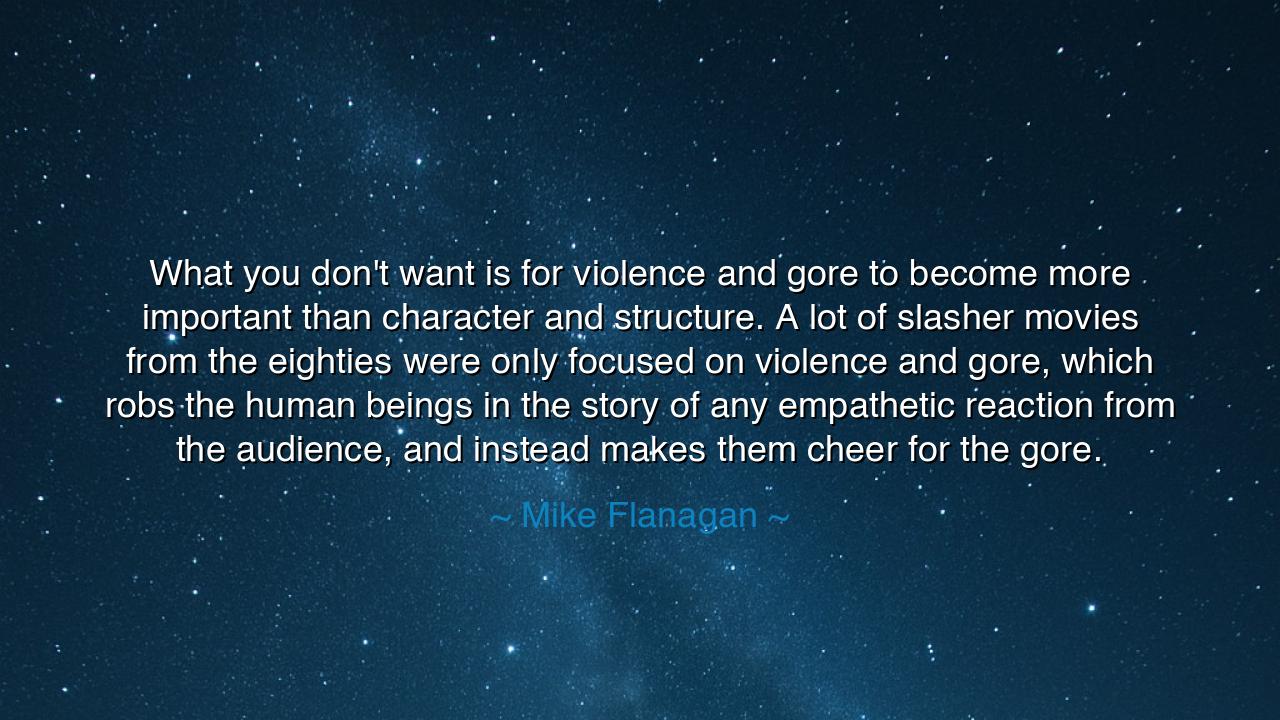
What you don't want is for violence and gore to become more
What you don't want is for violence and gore to become more important than character and structure. A lot of slasher movies from the eighties were only focused on violence and gore, which robs the human beings in the story of any empathetic reaction from the audience, and instead makes them cheer for the gore.






Mike Flanagan’s words, "What you don't want is for violence and gore to become more important than character and structure. A lot of slasher movies from the eighties were only focused on violence and gore, which robs the human beings in the story of any empathetic reaction from the audience, and instead makes them cheer for the gore," reveal a profound understanding of the true purpose of storytelling and its power to evoke empathy in its audience. Flanagan critiques a style of filmmaking that prioritizes sensationalism and shock over the human elements of a narrative. His observation speaks to a critical truth in the art of storytelling: when violence becomes the centerpiece of a film, it ceases to serve as a meaningful plot device and instead becomes a hollow spectacle that desensitizes us to the complexity of the human experience.
In the ancient world, the epic tales of heroes and gods were not only meant to entertain; they were designed to teach us about human nature and the consequences of our actions. Consider the Iliad and the Odyssey by Homer, works that are rich in action, yet do not glorify violence for violence’s sake. Instead, the battles and conflicts depicted in these stories are interwoven with character development and moral dilemmas. Achilles' wrath and Hector’s courage are not just plot points but reflect deeper questions about honor, pride, and the costs of war. Homer never allows the action to overshadow the humanity of the characters, showing us that the true weight of violence comes from its effect on the soul, not just the body. In this sense, violence in these ancient stories is always in service to understanding, not to spectacle.
The Greek tragedies also followed a similar path, as playwrights like Sophocles and Aeschylus used violence not to excite or shock, but to illuminate moral struggles. In Oedipus Rex, the violence of self-inflicted blindness is not about the brutality of the act, but about the tragic realization of a man who has unknowingly fulfilled a horrific prophecy. The human element—Oedipus’ inner turmoil, his guilt, and his shame—is what drives the audience to emotional catharsis. The violence, though intense, serves to deepen the character’s story, to force the audience to reckon with the consequences of human actions. This is in stark contrast to the films Flanagan criticizes, where the human cost of violence is often overlooked in favor of blood and spectacle.
Similarly, in the story of Hercules, his twelve labors were not just feats of strength but trials that tested his character and resolve. His struggles with the hydra or the boar of Erimanthos were metaphors for the inner demons and challenges he faced on his journey to redemption. Though Hercules' labors involved violence, it was his inner growth that defined the myth. The violence was a catalyst for change, not the end itself. The violence in these tales—whether through battle or sacrifice—was always a tool for understanding human nature, just as Flanagan suggests that violence in film must serve a deeper narrative purpose.
In contrast, slasher films from the 1980s often reduced violence to a shocking spectacle, where characters were reduced to mere victims or targets for the audience’s entertainment. These films, with their graphic gore and gratuitous kills, robbed the audience of empathy. They didn’t invite the viewer to reflect on the human cost of violence, but instead turned the act of killing into a form of entertainment, making the audience cheer for the bloodshed rather than feel its weight. Flanagan’s critique is a call to return to a storytelling tradition that places human experience at the center of the narrative. It is a reminder that violence without context, without the emotional resonance of the characters involved, loses its power to move us.
The lesson in Flanagan’s critique is clear: true art—whether in the form of film, theater, or any other medium—must always return to the human heart. The violence we witness in stories must not be glorified or sensationalized for its own sake. It must be a reflection of human frailty, a way to explore moral questions and psychological truths. When we are faced with violence in art, we should not merely recoil at the shock, but confront the deep emotional truth it reveals. The true weight of violence lies not in the blood spilled, but in the emotional scars it leaves behind. We must always seek to understand the characters, their struggles, and their inner conflict, for it is through these that the violence finds its true purpose.
In your own life, whether in the art you create or the stories you consume, do not be swayed by the superficial thrill of spectacle. Seek depth, seek meaning, and strive to understand the human element in every situation. Just as in ancient myths and epic tales, confront the darkness not for the sake of shock, but to better understand the complexity of the human condition. In doing so, you will elevate not only the art you create but the world you live in, turning violence from a tool of entertainment into a reflection of truth.






AAdministratorAdministrator
Welcome, honored guests. Please leave a comment, we will respond soon